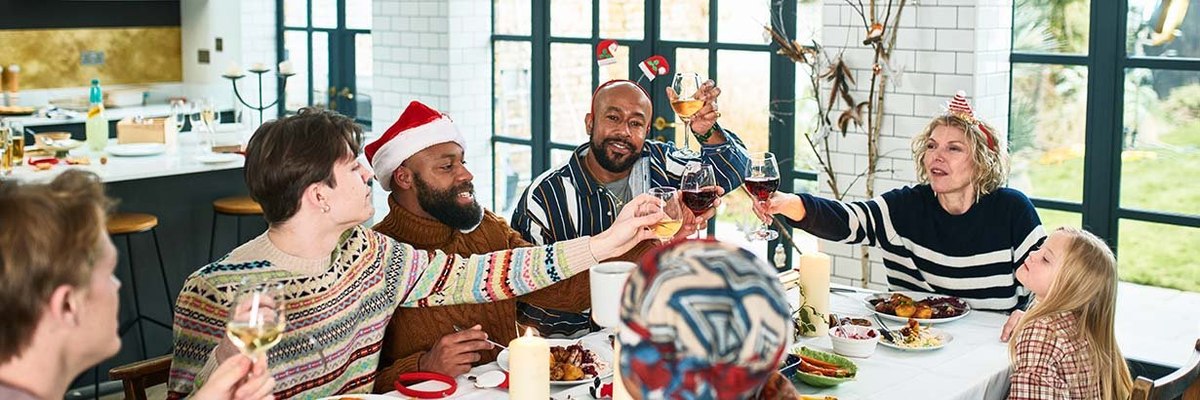While Christmas presents, dinner and trees are still commonplace, Christmas cards, pudding, and watching the monarch’s annual speech may be dying out
Christmas itself may be centuries old, but the way we have celebrated it has changed significantly. Christmas used to be a time for ghost stories, presents used to go on trees rather than under them, and mince pies used to contain meat.
This year, 88% of Britons say that they tend to celebrate Christmas. But what does that look like?
To no-one’s surprise, at the very top of the list is giving Christmas presents, which fully 96% who will celebrate Christmas this year say they intend to do. Around half say that at least some of these gifts will be presented in a Christmas stocking this year (51%). Fewer (29%) will be giving as part of a ‘Secret Santa’ session with friends, family or co-workers.
Having a Christmas dinner is a similarly universal component of the seasonal celebration, with 94% of Britons who celebrate Christmas saying they will have a dedicated Christmas dinner this year. A third (35%) also say they will go out with family for a Christmas meal.
Previous YouGov research has shown that roast potatoes are the public’s favourite part of Christmas dinner.
Crackers are very likely to feature at most dinner tables, with 81% who celebrate Christmas saying they intend to give them a pull.
In terms of other culinary aspects of Christmas, 72% say they will eat mince pies, and 52% a Christmas pudding. A third will also drink mulled wine (35%).
In a third place overall is listening to Christmas music, at 85%. Listening to Christmas carolers specifically is far less frequent, however, at just 34%. Going off to sing Christmas carols is rarer still, at 13%.
Previous YouGov research has shown which are the British public’s favourite Christmas songs.
Putting up a Christmas tree is a mainstay for 84% of those who celebrate Christmas. Far less common nowadays is setting up a nativity display, which only 18% do.
When it comes to the google box, eight in ten say they intend to watch a Christmas movie (80%), but only 35% intend to tune in to the King’s Christmas address.
Three quarters of those who celebrate Christmas will visit family at their homes (77%), while 67% likewise expect they will be visited by family at their own home.
Three quarters will likewise extend season’s greetings to family and friends with Christmas cards this year (74%).
It is also still common for Britons who celebrate Christmas to open Advent calendars (56%), while the newer development of wearing a Christmas jumper is also practiced by 54%.
Stepping outdoors, half will take a trip to a Christmas market (49%), and 43% will go to look at displays of Christmas lights (and 36% say they adorn their own home with lights).
Far fewer will take in a pantomime (18%) or visit a ‘winter wonderland’ site (14%) – doubtless due to the annual negative publicity such sites get.
While the Christmas period has long been associated with charity, only 33% will make Christmas donations, and just 11% will volunteer for charitable activities.
How does Christmas look in households with children?
When it comes to activities for children, a quarter (26%) will leave food and drink out for Father Christmas and/or his reindeer, 14% will visit Santa at a grotto, and 13% will partake in the American-invented ‘Elf on the shelf’, whereby an elf is displayed in different locations around the home over the festive period.
Of course, not every household has young children in, so if we restrict the results to just those with children aged nine or younger, we can see these figures increase dramatically. Among those with under-10s in the home, 78% will leave food out for Santa and co, 56% will visit them at a grotto, and 36% will play Elf on the Shelf. They are also significantly more likely than the wider population to be opening Advent calendars (86%) and putting gifts in Christmas stockings (81%).
What Christmas traditions are currently in decline?
An examination of age differences highlights six practices that may be in the process of dying off (as opposed to having already largely disappeared), with younger Britons far less likely to say they will be doing so than their elders.
The biggest gap involves Christmas cards – while 91% of the over-65s say that they will send such festive messages to loved ones this year, this falls to 55% among 18-24 year olds.
Mince pies and Christmas pudding may also be under threat: while 85% of older Britons eat the former, just 54% of younger Britons say the same, and older Britons are more likely to eat the latter by 69% to 34%.
Younger Britons are also less likely to want to listen to Christmas carolers (27% compared to 46% of their older counterparts) and similarly aren’t interested in hearing what the King has to say on the 25th (by 28% to 43%).
Young people are also less likely to donate to charity, although this could just be an indication of their different financial situations.
Those Christmas activities from our list that young people are more likely to do than their elders generally just indicate that they either have a child themselves or otherwise live in the same home as a young sibling.
Photo: Getty











